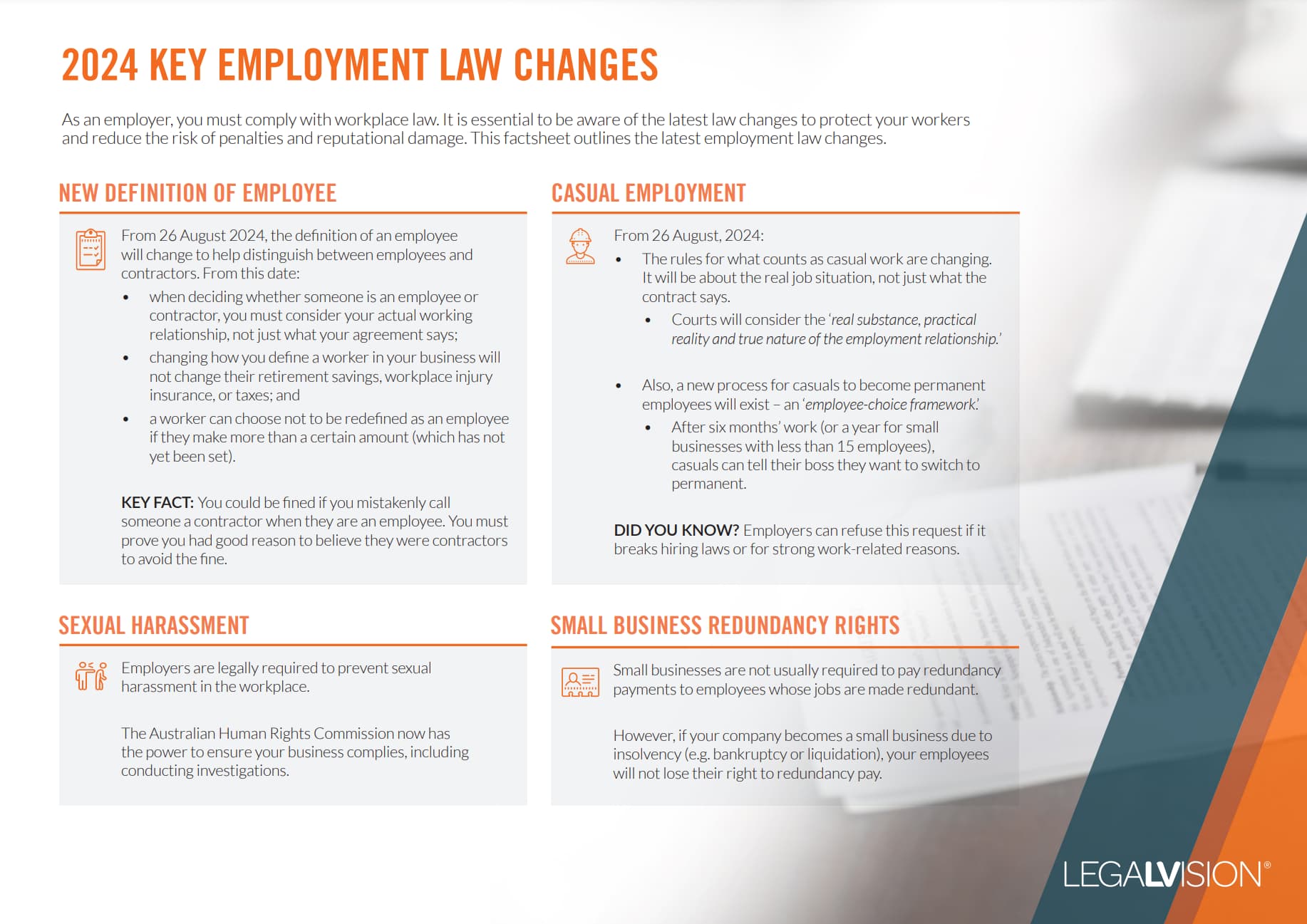In Short
- Regulators continue to focus on preventing workplace sexual harassment and psychological harm.
- Queensland has passed a ‘Respect at Work’ Bill, introducing significant changes to anti-discrimination laws.
- Tasmania has criminalised industrial manslaughter.
Tips for Businesses
Ensure your WHS policies are up-to-date and meet new legal requirements, including protections against discrimination and industrial manslaughter. Regular consultation with employees is critical when amending health and safety policies to avoid legal risks.
Employers must ensure workers’ physical and non-physical safety. Understanding what risks may arise in the workplace and how best to reasonably mitigate them will assist with ongoing WHS and OHS compliance.
Officers have ongoing obligations to ensure that their organisations remain compliant and to have updated and relevant knowledge of work health and safety matters. This update will help officers comply with their obligations and stay updated with changes to WHS by highlighting recent developments.
Regulators Focus
Regulators are continuing to focus on workplace sexual harassment and its impacts. They are also focusing more broadly on psychosocial hazards within the workplace, particularly with Mental Health Month being celebrated in October. Employers should consult workers and ensure safety mechanisms are in place to deal with such issues.
Amendments to Legislation
New Laws Shield Protect Claimants From Costs Orders
Federal parliament has passed a law protecting workers who file discrimination claims, including sexual harassment, from being responsible for the other party’s legal costs. In limited situations, applicants may still be required to pay costs, such as when a:
- claim is made without reasonable grounds; or
- party’s unreasonable actions lead to extra costs for the other side.
Queensland ‘Respect at Work’ Bill passes
The Queensland Government has passed a new law banning hostile work environments based on an individual’s sex and introducing specific protections against workplace harassment.
Employers in Queensland will have a positive duty (which is in addition to the positive duty that already exists under Commonwealth law) to take reasonable steps to eliminate sex-based discrimination, sexual harassment, harassment and certain other objectionable conduct.
Workers will also be protected by new changes that prevent discrimination based on:
- family or domestic violence;
- homelessness;
- physical appearance;
- expunged conviction;
- irrelevant criminal record; and
- irrelevant medical record.
These changes will commence from 1 July 2025.

As an employer, it is essential to understand what employment laws have changed and their implications for your business — particularly the changes to the Fair Work Act 2009 through the new Closing the Loopholes legislation.
Industrial Manslaughter
As discussed in our previous WHS and OHS regulatory update, several Australian jurisdictions have introduced or enhanced industrial manslaughter offences. In New South Wales, the new industrial manslaughter offence commenced on 16 September 2024.
Tasmania has become the last state to make industrial manslaughter a criminal offence. The law, effective from 2 October 2024, defines industrial manslaughter as when a worker’s death is caused by negligent actions of a business operator or officer.
Other Changes
Other recent changes include:
- Safe Work Australia published amendments to the model WHS regulations, which strengthen protections for workers at risk of exposure to silica dust across all industries, including building and construction.
- Safe Work Australia developed a Guide to managing the risks of rooftop solar installation work.
Cases and Incidents
Earlier this year, the Fair Work Commission (‘Commission’) made a decision that provides clarity for employers who intend to implement or amend existing work health and safety policies and procedures.
1. What Happened?
Opal Packaging Australia Pty Ltd (‘Opal’) aimed to update its alcohol and drug policy, including removing on-site alcohol self-testing machines and adjusting the policy on handling non-negative test results for over-the-counter or prescription medications. The proposed changes directly impacted workers, and a dispute arose. The Australian Manufacturing Workers’ Union (‘AMWU’) applied to the Fair Work Commission to resolve the dispute.
The AMWU argued that Opal failed to consult workers properly regarding the policy changes.
2. What Was the Outcome?
The Commission barred Opal from implementing the policy; however, it expressed that Opal could implement the proposed changes if they undertook further consultation processes.
The Commission found that where a policy may affect workers’ health and safety, an employer must follow the consultation obligations prescribed by law. This finding sets a low threshold as to when the consultation process would apply. The Commission also clarified that the effect may be neutral and did not require such change to be positive or negative.
The amendments to the existing policy were deemed unreasonable because Opal failed to provide workers with all relevant information, including the rationale behind the changes. The Commission blocked Opal from implementing the policy because it did not comply with its consultation obligations.
From the Commission’s findings, consultation obligations may include:
- Providing feedback to workers and their representatives on why the business declined to amend their proposed changes to the policy.
- Providing workers with relevant information relating to the proposed changes, such as:
- the rationale for the changes;
- the cost and benefit analysis;
- operational impacts analysis;
- risk assessments of the proposed changes;
- relevant information on industry practice; and
- any other information pertinent to the proposed changes.
- Undertaking meetings with workers to provide them with relevant information.
- Giving workers the opportunity to provide feedback or ask further questions and employers implementing ‘robust processes’ to record feedback and circulate those responses to all employees.
3. Key Takeaways
Employers who implement or amend existing policies that may affect workers’ health and safety must adhere to their consultation obligations.
Questions?
If you need legal assistance with a WHS matter or need help identifying an officer, book a consultation call on Prism. As a member, you can request unlimited legal advice consultations.
We appreciate your feedback – your submission has been successfully received.












